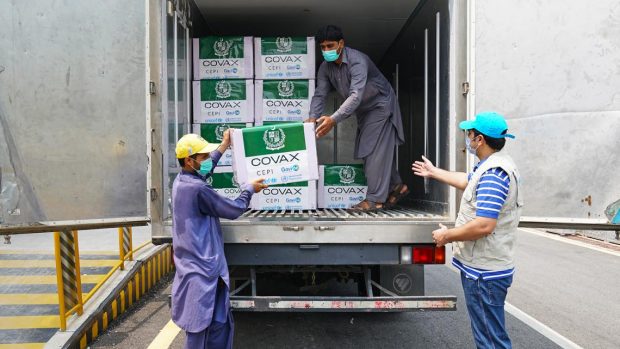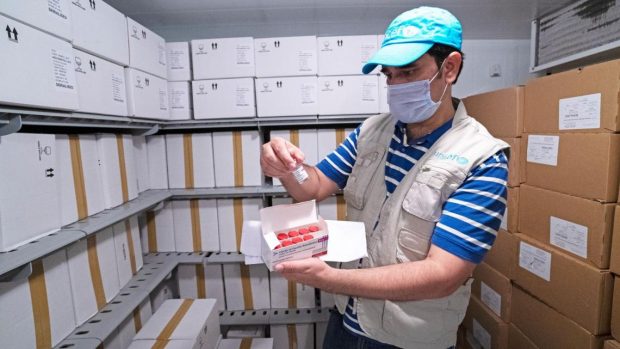COVID Delta variant registers rise in Pakistan’s coastal city Karachi

Delivery of vaccine under covax (Photo: UNICEF)
By Nasir Aijaz
AsiaN Representative
KARACHI: Pakistan is currently experiencing the fourth wave of COVID-19 amid Indian Delta variant, which has registered significant rise in Karachi, the largest city of country and capital of Sindh province, located on the Arabian Sea Coast.
This emerged in the National Command and Operations Center (NCOC) meeting hosted by Sindh Chief Minister Syed Murad Ali Shah here on Saturday and attended by Federal Minister Asad Umar and other federal officials.
Since the high positivity rate, hospital inflow and pressure on critical care occupancy has increased, the Sindh government had imposed stringent measures for control of rising cases in the province, especially in Karachi and other big cities from July 31 to August 8, 2021.
All the offices of provincial government, schools, colleges and universities, marriage halls, shrines, recreation places etc. were closed besides prohibiting indoor and outdoor dining at restaurants and curtailing business timings across the province.
However, the federal government did not cooperate with provincial government and kept all its offices and other institutions under its control opened. Surprisingly, the leaders of Pakistan Tehreek-e-Insaf (PTI), which rules at federal level and is opposition in Sindh, severely criticized the Pakistan peoples’ Party-led provincial government and instigated business community to violate the restrictions.

NCOC meeting in process (Sindh Information Department)
According to official statement, the NCOC meeting noted that 67 percent of total positive cases have emerged in six major cities – Karachi and Hyderabad (Sindh Province), Lahore and Rawalpindi (Punjab Province), Islamabad (Federal Capital) and Peshawar (Khyber Pakhtunkhaw Province).
It was disclosed that in Sindh all-time highest numbers and High Flow Oxygen occupancy reached nearly 80 percent of total capacity. The pressure on the health care system was expected to continue for weeks, therefore the addition of more beds in the healthcare system was decided.
It was pointed out that a similar pressure was also building up in Khyber Pakhtunkhaw (KPK) and Punjab.
The meeting was told that in Karachi 1,195 patients were in critical care on August 6 and within two days their number increased to 1,210 on August 8.
The meeting was told that the hospitals in the country were under pressure.
During the current week 562 patients have been admitted in hospitals all over Pakistan. In Sindh alone 176 patients were admitted and 159 in Punjab, 175 in KPK, and 36 in Islamabad 13 in AJK, and four in Balochistan. It was pointed out that on an average over 500 patients were being admitted in hospitals on a daily basis in addition to 70 to 80 patients in critical care on a daily basis in the country.
The NCOC disclosed that Karachi accounts for 79 percent Covid-19 cases in the province. During the current week Karachi had 10591 positive cases that constituted 21.4 percent and Hyderabad has 15 percent. It was pointed out that in Sindh cases had increased between the July 26 and August 1.
Currently, 102 patients are on ventilators in Karachi, one in Hyderabad, 22 in Rawalpindi, 36 in Peshawar, 43 in Islamabad, 20 in Bahawalpur and 10 in Gujranwala.
The meeting was told that mortality has also started to rise again after a consistent downward trend for two weeks in the country. During the last six days 63 patients have died on average. It was pointed out that the rising death toll was likely to continue until the load on critical care subsided.

Delivery of vaccine under- covax (Sindh Information Department)
The mortality trend shows that from 5 July to 1 August, some 285 patients died in the Punjab, 489 in Sindh, 125 in KPK, 24 in Islamabad, 39 in AJK and 14 in Balochistan.
The meeting was told through presentations that the country was likely to witness a rise in disease during the coming weeks of August if SOPs were not followed.
Meanwhile, according to another official report the total number of Covid-19 cases since March 2020 till August 6, 2021 in Pakistan is over one million with death toll of 23797. This include 397000 cases and 6168 deaths in Sindh, 363000 cases and 11172 cases in Punjab, 90,093 cases and 811 deaths in Islamabad, 147000 cases and 4524 deaths in KPK, 31069 cases and 331 deaths in Balochistan, 8615 cases and 150 deaths in Gilgit-Baltistan and 26421 cases and 641 deaths in Pakistan-administered Azad Jammu & Kashmir.
As regards vaccination drive, a UNICEF press release said nearly 7 million people have received two doses of Covid-19 vaccine and more than 24 million have received one dose so far in Pakistan.
More than 8 million doses of Covid-19 vaccine have so far arrived in Pakistan through COVAX and more are on the way. This includes 2.4 million doses of AstraZeneca, 100160 doses of Pfizer and 5.5 million doses of Moderna, latter donated by the United States under COVAX dose-sharing mechanism.
Moreover, Pakistan government has purchased nearly 30 million doses of Covid-19 vaccine licensed in China through bilateral agreements. The country has also started bottling PakVac, a one-dose vaccine licensed from China. The government will also buy 13 million doses of Pfizer vaccine over the coming months.
Other reports suggest that the vaccination process was slow at the outset but it geared up after the government warned of blocking the mobile SIMs and social media accounts of people who deny the vaccination. In Sindh, the government had warned stopping the release of government employees if they didn’t get vaccinated. Now, there could be seen long queues at vaccination centers round the clock while 20,000 calls are received daily across Pakistan for registration to get vaccinated. любой займ онлайн

























































